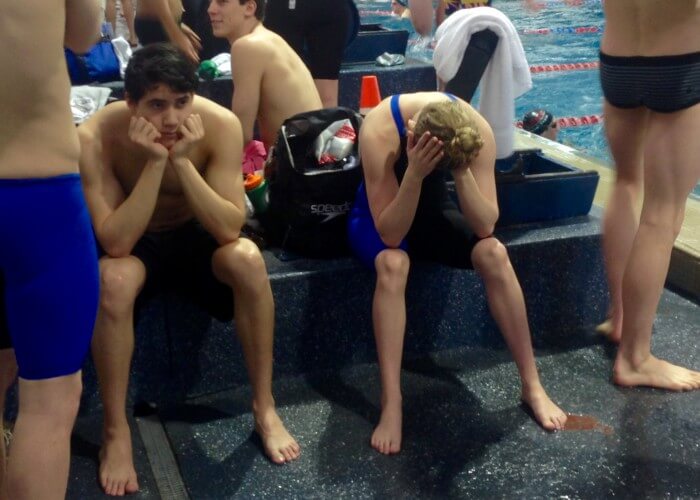Swimming With Anxiety: 3 Helpful Coping Mechanisms

By Taylor Padington, Swimming World College Intern
There is no doubt that swimming is one of the world’s most mentally challenging sports. Swimmers are put into a single lane, day in and day out, to swim countless amounts of laps, only to be put into a race to drop a few tenths of a second. Even if you are a swimmer that is not at an Olympic level, the pressure of performing in a swim set, or meet, can be daunting. Swimmers are constantly battling the pressures of time, approval from coaches, self-approval, so it is no wonder that many swimmers struggle with anxiety.
Types of Anxiety

Photo Courtesy: Abby Boone
There are two types of common anxiety that swimmers face, the first being negative anxiety. Negative anxiety is a type of anxiety that many swimmers can be plagued with and it can be detrimental to their mental state during swimming. One way to understand negative anxiety is through the words of Dr. John M Hogg, who has specialized in the mental state of athletes over the past few decades. Dr. Hogg states that “negative anxiety, which is really just stress, occurs when athletes either A) do not know what they are doing (unprepared), B) feel overly apprehensive (unready), C) feel they are not full informed (uncertain) or D) feel they are unable to meet the task demands (incapable).”
So does this mean that swimmers only deal with anxiety through a negative fashion? Not necessarily. Most people think of anxiety, as a term that is brought about by a sense of apprehension related to a perceived threat, yet that is not always the case.
There is also a term known as positive anxiety, which occurs when an athlete feels excitement and anticipation to engage in training or competition because they feel prepared and ready to perform. So where do swimmers find the balance? We know that when swimming, a little nerves can be a good thing; however, too many nerves can derail us, so what can swimmers do to help calm themselves down?
1. Breathing Pattern Awareness
Getting to a relaxed state helps control anxiety and a great way to get to this relaxed state is through breathing. Taking shallow, relaxation-focused breathes will help the raw nerves calm down. Furthermore, using deep, rhythmic breathing will help you control your heart rate and enter a more focused zone.
2. Imagery
Use imagery to help guide you where you want to go. Before even jumping into the pool, or starting a race, visualize what you want to happen. If you are visualizing a race, imagine the pool: the sounds that you will hear, and the way your body will feel in the water. The same goes for a practice: imagine the times you want to be hitting on your pace. Using visualization only needs to take a few minutes, but it can be extremely effective since you are taking your body and mind through the motions that it is about to go through. A key component to visualizing is making sure that all the imagery you are creating is positive, that way your mind is more at ease come practice or race day.
3. Self-Talk
One of the most effective tools for entering a relaxed state is positive self-talk. Through talking to yourself about what is about to happen, you eliminate self-doubts. There are many swimmers who have a script that they read either before bed, practice or a race. The script will typically go along the lines of “you are strong… you can do this… you have put in all the hard work.” These scripts can help you focus on your goals and eliminate negative thoughts that come creeping into your mind.
Through the use of breathing patterns, imagery and self-talk and motivation, the weight of anxiety can be lessened. Not all swimmers are alike, but by being able to identify your anxiety surrounding swimming you will be better equipped to find strategies that will help calm your mind.




thank you Marsha M. Linehan (Official)
Amy Smith you need to read this
Nikki Hodgson Bornman
Matea Samardzic zvijezdo, na naslovnoj slici si 🙂 pozdrav od prije
Dennis Simonov 59.9
Carly Fried me